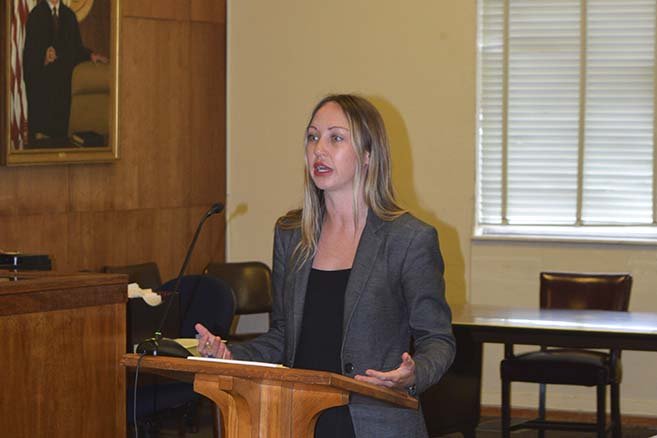[[{“value”:”
Brewton woman found not guilty of pot, paraphernalia possession
Attorney Cierra White makes a point to the jury during the Law Day trial.
By DON FLETCHER
News Staff Writer
As the Alabama Legislature works to regulate Delta 8 THC and other hemp derivatives that are currently sold at convenience stores and other outlets across the state, a jury of high school seniors acquitted last week a Brewton woman who was charged with second-degree possession of marijuana, although the substance she had in her home was not pot.
Defense attorney Cierra White argued successfully during the trial of Whitney Gavin, part of the county’s May 1 Law Day observance, that her client’s arrest was baseless, that the Delta 8 product of which Ms. Gavin was in possession is currently legal under federal law, with no specific state restrictions.
While hemp and marijuana come from the same plant (cannabis sativa), the Agriculture Improvement Act of 2018 removed hemp from the definition of marijuana in the Controlled Substances Act. The major difference between hemp and marijuana is that hemp is a mixture of male and female cannabis plants, and its flowers produce less than 0.3-percent THC.
Hemp is sold across Alabama in flower (smokable) form, as well as in gummies, candies, chips and even some drinks. It is identical to marijuana in its natural form and gives off a similar smell when burned.
A bill introduced by District 6 State Representative Andy Whitt passed the state’s House of Representatives last week and is currently awaiting ratification by the state Senate. The legislation, if passed, will authorize the Alabama Alcoholic Beverage Control Board to regulate all consumable hemp products, including prohibition of sales to individuals under the age of 21.
Currently there is no age limit for purchase of hemp products that can’t be smoked.
“If you’re currently taking CBD or you’re currently taking a gummy to help you sleep, there will be an avenue for you to purchase that,” Whitt said after the bill passed. “It will just be in 21-and-over stores, it will be regulated, and it will be tested.”
The case against Ms. Gavin was made by sheriff’s deputies, one of whom admitted the substance was never sent to a crime lab for testing, after the officers responded to a domestic affair at the woman’s home.
Trial testimony showed she allowed deputies into her home to accompany her former boyfriend as he retrieved some of his belongings. She had the Delta 8 on her bed, in plain view, along with at least one pipe that had residue in it. The deputies arrested her for pot and paraphernalia possession after spotting the marijuana lookalike.
After her attorney settled the issue of whether or not what her client had in her home was marijuana, she argued successfully that the pipe was used to smoke a substance that is strictly legal, therefore negating the paraphernalia charge. The teen jury agreed.
Atmore Police Chief Chuck Brooks, who admitted that no roadside test exists to determine the difference between hemp products and marijuana, said when city officers are confronted with a similar situation, they err on the side of caution.
“I knew a couple of years ago this could be problematic,” Brooks said. “If an officer is not 100-percent certain what the substance is, we normally confiscate it and let the person know that it will go to the lab for testing and verification. We give the district attorney’s office all the pieces to successfully prosecute a case.”
Brooks added that the department’s evidence custodian has been “burning up the miles, back and forth between here and [the state crime lab in] Mobile” since hemp products became available for general purchase.
“It’s not set in stone that [the officer] has to make an arrest right there,” he explained. “We’re not scientists, and an arrest doesn’t mean an individual is not entitled to due process. If the substance comes back as legal, we notify the DA’s office, and usually they will nol pros [choose not to prosecute] the case right then.”
Brooks also pointed out that Atmore officers receive constant instruction in identifying illicit substances and in handling or identifying evidence in other criminal situations.
“The more trained our officers are, the better they can do their job,” he said. “We spend a lot of money training, training, training. If we are executing a search warrant for something else — stolen property — and we find drugs, we apply for a second warrant for the drugs.”
Despite the extra work in making sure a person charged with possession of an illicit substance actually has an illegal substance, the police chief said it is just another component in enforcement of the law.
“It hasn’t created a burden for city police,” he said. “We’re just doing our job.”
“}]] Brewton woman found not guilty of pot, paraphernalia possession By DON FLETCHERNews Staff Writer As the Alabama Legislature works to regulate Delta 8 THC and other hemp derivatives that are currently sold at convenience stores and other outlets across the state, a jury of high school seniors acquitted last week a Brewton woman who was Read More


